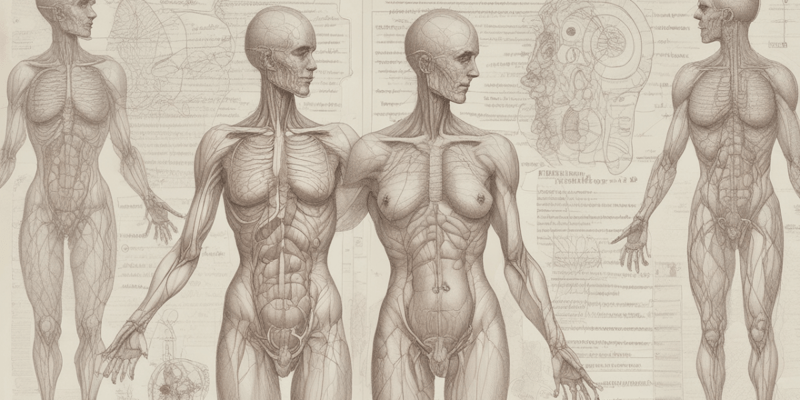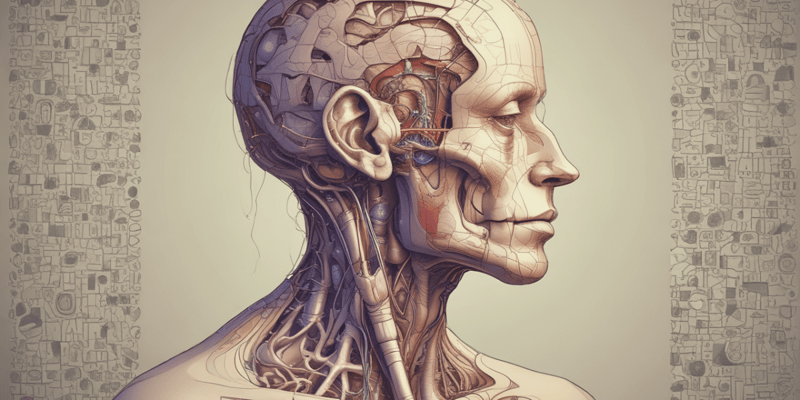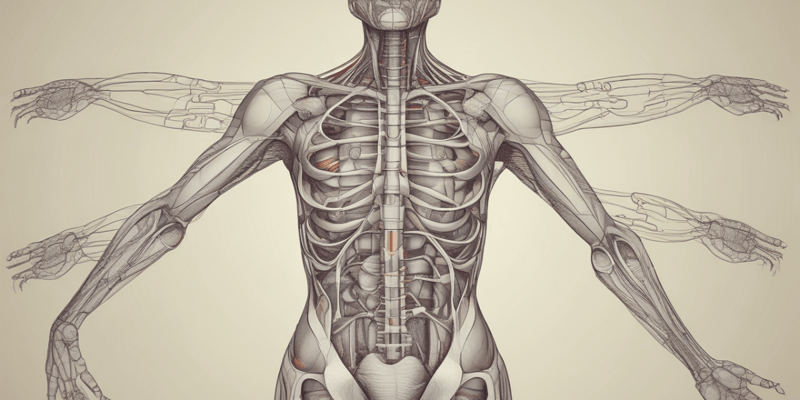53 Questions
What is the percentage of an adult animal's total body weight made up of water?
60%
What is the term for substances that are dissolved in body water?
Solutes
Which of the following is an example of an electrolyte?
Sodium
What is the primary function of body fluids?
Maintaining normal body functions
What is the significance of water in the body?
It is essential for normal body function
What is the main difference between intracellular and extracellular fluid?
The location in relation to cells
What is the approximate distribution of body water between intracellular and extracellular spaces?
Two-thirds inside cells and one-third outside of cells
What is the term for the spaces within the body where fluids are found?
Compartments
What is the general term for substances like glucose that are dissolved in body water?
Solutes
What is the significance of the distribution of body water between intracellular and extracellular spaces?
It is critical for normal body function
What is the primary function of electrolytes in the body?
To regulate various bodily functions
What is the main difference between intravascular fluid and interstitial fluid?
Their location
What is the term for the fluid found in the central nervous system?
Cerebrospinal fluid
Why is the distribution of body water between intracellular and extracellular spaces important?
Because it affects cellular function
What is the general term for fluids found outside of cells?
Extracellular fluid
What is the primary reason for the movement of water across cell membranes?
To maintain normal fluid balance within the body
What is the term for the pressure created by plasma proteins within the blood?
Colloid osmotic pressure
What is the approximate proportion of body water found outside of cells?
⅓
What is the main factor that affects the movement of water across cell membranes?
Differing solute concentrations
What is the primary function of electrolytes in the body?
Maintenance of normal fluid balance
What is the term for the fluid compartment that includes cerebrospinal fluid (CSF)?
Transcellular fluid
What is the primary mechanism by which water moves across cell membranes?
Osmosis
Which of the following is NOT a type of extracellular fluid?
Intracellular fluid
What is the term for the pressure created by differing solute concentrations between fluids in separate compartments?
Osmotic pressure
Which of the following is a factor that affects the movement of water across cell membranes?
Solute concentration gradients
What proportion of body water is found outside of cells?
One-third
What is the term for the fluid compartment that includes cerebrospinal fluid and other specialized fluids?
Transcellular fluid
What is the main function of plasma proteins in the blood?
To create colloid osmotic pressure
Which of the following is responsible for maintaining normal fluid balance within the body?
The movement of water across cell membranes
What is the primary difference between intravascular fluid and interstitial fluid?
Their location within the body
What is the result of differing solute concentrations between fluids in separate compartments?
Osmotic pressure
What is the significance of the distribution of body water between intracellular and extracellular spaces?
It is critical for normal body function
What is the primary factor that affects the movement of water across cell membranes?
Osmotic pressure
What is the primary source of water in the body?
Metabolism of food
Which of the following is a way the body loses water?
Vomiting and diarrhea
What is the main function of the hypothalamus in the body's water regulation?
To detect changes in body fluid
What is the purpose of the regulation of fluid volume in the body?
To maintain homeostasis
What is responsible for regulating the body's fluid balance?
The kidneys
What is one way the body gains water?
Drinking fluids
What is the purpose of regulating fluid volume in the body?
To maintain homeostasis
How does the body produce water?
Through the metabolism of food
What is involved in regulating the body's fluid balance?
The hypothalamus and kidneys
What is lost through the respiratory tract and skin?
Water
What is one way the body gains water?
Through metabolism of food
What is the primary mechanism for regulating fluid balance in the body?
The kidneys and hypothalamus
What can happen if the body's ability to regulate fluid balance is disrupted?
All of the above
What is lost through the respiratory tract and skin?
Water
What can interfere with the body's ability to maintain fluid balance?
Disease processes
What is one way the body gains water?
Drinking fluids
What is the purpose of regulating fluid volume in the body?
To maintain homeostasis
What can happen if the body's ability to regulate fluid balance is disrupted?
The body may become dehydrated
What is involved in regulating the body's fluid balance?
Receptors, hormones, the hypothalamus, and the kidneys
What is lost through the respiratory tract and skin?
Water
Study Notes
Body Fluids Composition
- Body fluids consist of water and its solutes, which are substances dissolved in the body water.
Solutes in Body Fluids
- Electrolytes, such as sodium, chloride, and potassium, are essential solutes in body fluids.
- Other solutes include glucose and other substances.
Importance of Body Water
- Approximately 60% of an adult animal's total body weight is comprised of water.
- Water is critical for normal body function and overall health.
Fluid Physiology: Body Fluids
- Body fluids consist of water and its solutes, known as substances dissolved in body water.
Body Fluid Composition
- Electrolytes are a type of solute, examples include sodium, chloride, and potassium.
- Other solutes include substances like glucose.
Body Water Distribution
- Approximately 60% of an adult animal's total body weight is made up of water, crucial for normal body function.
- Body water is divided between two main compartments: intracellular and extracellular spaces.
Intracellular and Extracellular Fluids
- ⅔ of body water is intracellular fluid (ICF), located inside cells.
- ⅓ of body water is extracellular fluid (ECF), located outside of cells.
Body Fluids Composition
- Body fluids consist of water and its solutes (substances dissolved in water)
- Solutes include electrolytes (e.g. sodium, chloride, potassium) and other substances (e.g. glucose)
Body Water Distribution
- Approximately 60% of an adult animal's total body weight is made up of water, which is critical for normal body function
- Body water is distributed between intracellular and extracellular spaces within the body
- ⅔ of body water is intracellular fluid (ICF), located inside cells
- ⅓ of body water is extracellular fluid (ECF), located outside of cells
Extracellular Fluid (ECF) Compartments
- ECF is further divided into three compartments:
- Interstitial fluid (fluid around cells)
- Intravascular fluid (plasma)
- Transcellular fluid (e.g. cerebrospinal fluid - CSF)
- Fluid composition varies between these different compartments
Body Fluid Composition
- Body fluids consist of water and its solutes (substances dissolved in the water)
- Solutes include electrolytes (e.g. sodium, chloride, and potassium) and other substances (e.g. glucose)
Body Fluid Distribution
- Approximately 60% of an adult animal's total body weight is made up of water
- Body water is distributed between intracellular and extracellular spaces within the body
- ⅔ of body water is inside cells (intracellular fluid, ICF)
- ⅓ of body water is outside of cells (extracellular fluid, ECF)
Extracellular Fluid (ECF) Compartments
- ECF is further divided into:
- Interstitial fluid (fluid around cells)
- Intravascular fluid (plasma)
- Transcellular fluid (e.g. cerebrospinal fluid, CSF)
Fluid Movement and Balance
- Water moves across cell membranes to maintain normal fluid balance within the body
- Factors that affect this movement include:
- Differing solute concentrations between fluids in separate compartments (osmotic pressure)
- Presence of plasma proteins within the blood (colloid osmotic pressure)
- Blood pressure (hydrostatic pressure)
Body Fluid Composition
- Body fluids consist of water and its solutes (substances dissolved in the water)
- Solutes include electrolytes (e.g. sodium, chloride, and potassium) and other substances (e.g. glucose)
Body Fluid Distribution
- Approximately 60% of an adult animal's total body weight is made up of water
- Body water is distributed between intracellular and extracellular spaces within the body
- ⅔ of body water is inside cells (intracellular fluid, ICF)
- ⅓ of body water is outside of cells (extracellular fluid, ECF)
Extracellular Fluid (ECF) Compartments
- ECF is further divided into:
- Interstitial fluid (fluid around cells)
- Intravascular fluid (plasma)
- Transcellular fluid (e.g. cerebrospinal fluid, CSF)
Fluid Movement and Balance
- Water moves across cell membranes to maintain normal fluid balance within the body
- Factors that affect this movement include:
- Differing solute concentrations between fluids in separate compartments (osmotic pressure)
- Presence of plasma proteins within the blood (colloid osmotic pressure)
- Blood pressure (hydrostatic pressure)
Body Fluid Composition
- Body fluids consist of water and its solutes (substances dissolved in the water)
- Solutes include electrolytes (e.g. sodium, chloride, and potassium) and other substances (e.g. glucose)
Body Fluid Distribution
- Approximately 60% of an adult animal's total body weight is made up of water
- Body water is distributed between intracellular and extracellular spaces within the body
- ⅔ of body water is inside cells (intracellular fluid, ICF)
- ⅓ of body water is outside of cells (extracellular fluid, ECF)
Extracellular Fluid (ECF) Compartments
- ECF is further divided into:
- Interstitial fluid (fluid around cells)
- Intravascular fluid (plasma)
- Transcellular fluid (e.g. cerebrospinal fluid, CSF)
Fluid Movement and Balance
- Water moves across cell membranes to maintain normal fluid balance within the body
- Factors that affect this movement include:
- Differing solute concentrations between fluids in separate compartments (osmotic pressure)
- Presence of plasma proteins within the blood (colloid osmotic pressure)
- Blood pressure (hydrostatic pressure)
Water Balance
- Water is gained through:
- Drinking fluids
- Consuming food that contains water
- Metabolic processes that produce water as a byproduct of food metabolism
Water Loss
- Water is lost through:
- Urination
- Defecation
- Exhalation through the respiratory tract
- Sweat through the skin
- Vomiting and diarrhea
Regulation of Water Balance
- The body regulates fluid volume to maintain homeostasis by matching daily fluid inputs and outputs
- Key components of this regulation include:
- Receptors that detect changes in body fluid
- Hormones that help regulate fluid balance
- The hypothalamus in the brain, which plays a crucial role in regulating fluid balance
- The kidneys, which help regulate fluid volume and electrolyte balance
Water Balance
- Water is gained through:
- Drinking fluids
- Consuming food that contains water
- Metabolic processes that produce water as a byproduct of food metabolism
Water Loss
- Water is lost through:
- Urination
- Defecation
- Exhalation through the respiratory tract
- Sweat through the skin
- Vomiting and diarrhea
Regulation of Water Balance
- The body regulates fluid volume to maintain homeostasis by matching daily fluid inputs and outputs
- Key components of this regulation include:
- Receptors that detect changes in body fluid
- Hormones that help regulate fluid balance
- The hypothalamus in the brain, which plays a crucial role in regulating fluid balance
- The kidneys, which help regulate fluid volume and electrolyte balance
Water Acquisition and Loss
- Water is gained through drinking fluids, food, and metabolism of food
- The body produces water during food metabolism
Methods of Water Loss
- Urination
- Defecation
- Respiratory tract (breathing) and skin (sweat) losses
- Vomiting and diarrhea
Regulation of Body Fluids
- The body maintains homeostasis by regulating fluid inputs and outputs
- Key components of fluid regulation include:
- Receptors detecting changes in body fluid
- Hormones
- Hypothalamus in the brain
- Kidneys
Disease Impacts on Fluid Regulation
- Disease processes can interfere with drinking and eating, or increase fluid losses
- Examples: vomiting, diarrhea, excessive urination
- Severe dehydration can be life-threatening
- Disruption of electrolyte balance can have serious consequences
Water Acquisition and Loss
- Water is gained through drinking fluids, food, and metabolism of food
- The body produces water during food metabolism
Methods of Water Loss
- Urination
- Defecation
- Respiratory tract (breathing) and skin (sweat) losses
- Vomiting and diarrhea
Regulation of Body Fluids
- The body maintains homeostasis by regulating fluid inputs and outputs
- Key components of fluid regulation include:
- Receptors detecting changes in body fluid
- Hormones
- Hypothalamus in the brain
- Kidneys
Disease Impacts on Fluid Regulation
- Disease processes can interfere with drinking and eating, or increase fluid losses
- Examples: vomiting, diarrhea, excessive urination
- Severe dehydration can be life-threatening
- Disruption of electrolyte balance can have serious consequences
Learn the fundamentals of body fluids, including their composition, solutes, and electrolytes, and understand their importance in normal body function.
Make Your Own Quizzes and Flashcards
Convert your notes into interactive study material.
Get started for free




